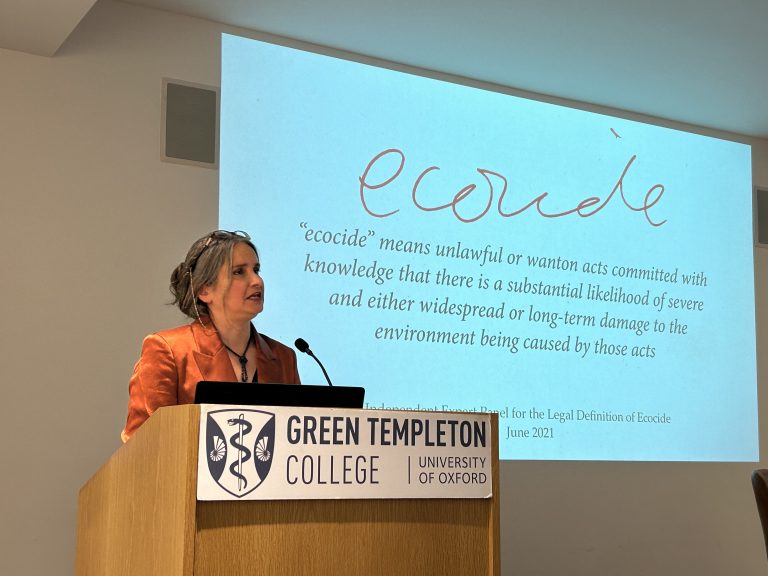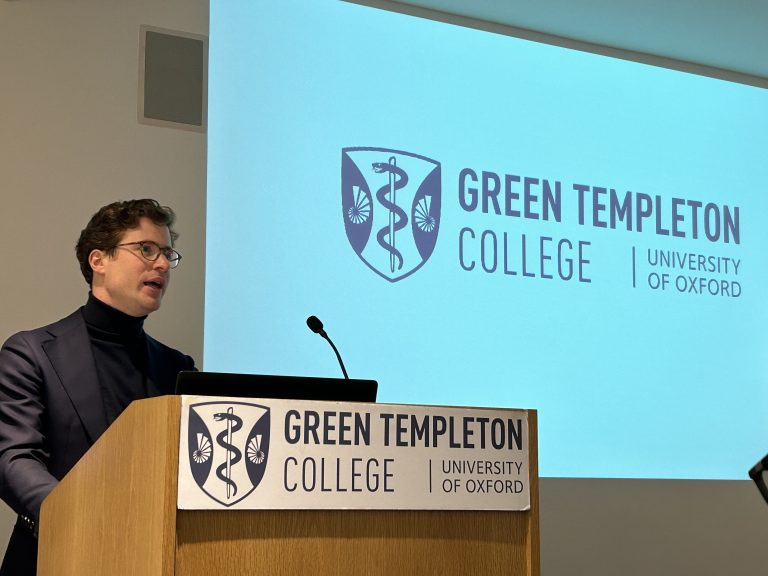Jojo Mehta and Thom Wetzer on Planetary Health and legal ramifications
The third and final of the Green Templeton lecture series 2024 took place on Thursday 22 February. Introduced by Dr SanYuMay Tun and Moderated by Dr Laurence Wainwright.
Read the report of the lecture
Olukayode Fasominu (MSc Global Healthcare Leadership, 2023) writes
Stop Ecocide International co-founder and Executive Director Jojo Mehta, and founding director of the Oxford Sustainable Law Programme Thom Wetzer provided views as distinguished speakers on ‘Planetary Health and legal ramifications’.
Jojo Mehta on Ecocide Law

Jojo Mehta spoke on the impact of compartmentalisation on our planet through environmental exploitations (ecocide), the need to address ecocide through legal frameworks, and the role of advocacy in legitimising and recognising ecocide, including progress made so far.
Mehta underscores how compartmentalisation pervades societal structures, shaping education, lifestyle, and our relationship with the environment. This mindset fuels resource exploitation, perpetuated by flawed beliefs embedded in Western economic and political systems. Authors like Jeremy Lent have long noted this cognitive separation.
When we damage the Earth, there are consequences
While warnings from scientists and indigenous communities persist, exploitation persists, causing environmental harm. Mehta stresses the pivotal role of indigenous communities in biodiversity conservation, recognising their profound emotional and spiritual connection to nature.
Mehta emphasises the necessity of law in indigenous communities to counteract environmental exploitation, viewing it as a fundamental human right essential for societal order and safety. She defines law as a set of agreed-upon rules to prevent danger, violence, and chaos, yet acknowledges a historical failure to address the profound danger of large-scale environmental destruction. This gap has spurred initiatives like Stop Ecocide International to bridge the disconnect between legal systems and the preservation of the planet.
Evolution of and definition of ecocide
The concept of ecocide to denote environmental damage dates back to the 1970s, and gained traction through legal efforts but wasn’t officially codified into international law. In 2020, a renewed push for clarity led to the development of a concise definition by an Independent Expert Panel convened by Mehta’s organisation. This definition, simple yet comprehensive, outlines ecocide as unlawful acts causing substantial and long-term environmental damage, based on legal precedent and adaptable to various jurisdictions. It aims to address the most severe environmental harms while complementing existing laws.
Legitimising and recognising ecocide through advocacy
Mehta advocates for criminalising ecocide to reinforce existing environmental laws, aiming to hold individuals accountable for severe environmental harm. Through Stop Ecocide International, she seeks to elevate ecocide to the level of serious crimes like genocide or war crimes at the International Criminal Court. This approach goes beyond punishment, aiming to change norms and deter harmful practices. Mehta critiques current environmental laws for their poor enforcement and lack of significant consequences for breaches. She emphasises the need to strengthen existing agreements to ensure individuals and companies take environmental obligations seriously, potentially facing legal consequences for ecocide.
Progress made on criminalising ecocide and factors driving it
There is a growing global interest in enacting ecocide laws, with governments like Brazil, the Netherlands, and Scotland proposing such legislation. International bodies like the European Union are also considering including ecocide in their environmental laws. This shift is supported by influential organisations and prominent figures like Pope Francis. The clear definition of ecocide has been instrumental in driving this progress, providing a basis for discussions and advocacy efforts led by Stop Ecocide International. Key elements include setting a high threshold for the crime, focusing on severe harm, and shifting the focus from avoiding penalties to considering real-world impacts, akin to how murder laws prioritise preventing death.
Where do we go from here?
Amidst global challenges, the proposal of ecocide law emerges as a hopeful solution, addressing contemporary crises and societal shifts. It acknowledges the significant impact of environmental displacement, exceeding that of conflict-related displacement. Similar to historical movements, ecocide law represents a crucial step towards societal change through legal avenues. Its traction is bolstered by recent mobilisations, highlighting the power of human intention in shaping a better future within the Anthropocene era.
Legal Innovation and Planetary Health
Thom Wetzer shared insights on ‘Legal Innovation to Restore Planetary Health and Save Our Commons’ to enable the reversal of the environmental impacts of human actions on our planet.
State of our planet and decoupling of human and natural world
Wetzer’s analysis highlights the dire condition of the planet, attributing its illness to human exploitation of natural resources over centuries, including rising greenhouse gas emissions, increased fossil fuel extraction, and widespread plastic pollution. Despite improvements in human health indicators, such as increased life expectancy and reduced air pollution deaths, these gains come at the expense of declining biodiversity such as due to pesticide use.
He underscores the intrinsic link between human and natural worlds, revealing an imbalance caused by human exploitation for the benefit of society, exacerbated by the ways we regulate (or fail to regulate) free-market capitalism. This imbalance, fuelled by deliberate human choices and aided by legal systems, has led to what Wetzer terms as ‘market failures,’ indicating the need for legal intervention to rectify the situation.
Wetzer defines law as both a reflection of societal morality and a structure shaping human behaviours, suggesting a role for legal innovations to address the current imbalance. A drawing from Carlijn Kingma visualises this imbalance, depicting humanity’s exploitation of nature, leading to a sick planet and ultimately jeopardising human existence.
Garret Hardin’s ‘Tragedy of the Commons’ further underscores the consequences of unchecked exploitation, warning of ruin when individual interests override collective well-being in a society that prioritises freedom without considering its impact on the commons. However, Wetzer stressed that Elinor Ostrom’s work has shown communities have historically found ways to govern the commons effectively. Wetzer’s analysis calls for urgent legal and societal changes to restore harmony between humanity and the natural world before irreversible damage occurs at a planetary scale.
Addressing the imbalance – The Great Reconciliation
Wetzer highlights the potential for legal innovation to address the imbalance between human activities and the natural world, advocating for reconciliation and balance through changes in legal frameworks. He suggests aligning rules to promote both human welfare and environmental conservation, facilitating progress without requiring wholesale system change. Wetzer underscores the importance of identifying effective levers within existing systems to recalibrate them towards sustainability, in part on the ground that in light of the urgency of sustainability challenges we do not have the luxury of time to overhaul the system. Overall, he expresses optimism about the role of legal innovation in supporting these changes, citing four examples to illustrate its potential impact.
Understanding causality
Wetzer discusses the significance of attribution science in understanding the relationship between natural disasters and climate change caused by human activities. These studies provide clear evidence of causality, making it difficult to ignore the impacts of climate change. The insights gained from attribution science can inform legal changes and shape existing legal frameworks. For instance, a recent case in Peru saw a farmer suing a German energy company for costs to protect his village from the impacts of climate change. Attribution science supports the claim by providing evidence that glacial melting in the Peruvian mountains was caused by human influence. These findings directly influenced the legal case against the German energy company, despite its lack of operations in Peru. Success of such cases could set a precedent for holding companies accountable for their contributions to climate change, potentially impacting similar cases worldwide.
Scientific evidence base
Advancements in science enhance accountability by providing a stronger foundation for climate-related claims, empowering vulnerable populations to pursue legal action. With improved scientific understanding, we can better grasp the interconnectedness between human activities and their effects on global biodiversity. This knowledge has influenced legal innovations, particularly in addressing the reliance on unproven CO2 removal technologies, which may violate international law and pose significant risks to humanity.
Intertemporal governance
Long-term planetary health issues pose a challenge for governance systems that struggle to address evolving problems over time. Legal innovation becomes essential to ensure timely implementation of necessary laws, as demonstrated in Germany where concerns about intertemporal equity violations prompted immediate government action rather than postponing responses to future generations.
Evolving ‘open norms’
Legal frameworks often rely on open norms, such as definitions of citizenship and rights, which evolve as societal values change. These changes can be influenced by global agreements like the Paris agreement, leading to more corporate climate cases, with companies like Shell facing legal action for their roles in contributing to emissions. Wetzer suggests that open norms are intentionally designed to allow for and foster innovation within legal systems.
Economic impact of legal Innovation
These new approaches in legal innovation signify a shift towards reconciliation between human activity and nature, aiming to understand impact, stimulate innovation, and move towards a ‘great reconciliation.’ Legal principles delineate permissible actions and associated costs, particularly concerning environmental harm, potentially holding large polluting companies accountable. Climate litigation, exemplified by cases in California, Chicago, and New York against oil companies, underscore the legal disruption and economic impacts of these efforts. Moreover, these litigations highlight concepts like greenwashing and ecocide, demonstrating the evolving legal landscape. Estimates of the societal cost of emissions, such as Chevron’s $8.6 trillion cost until 2010, reveal the potential liabilities companies may face. Similarly, Shell’s emissions contributed to $280 million in losses from Hurricane Harvey, emphasising potential legal liabilities. While the planet is in a precarious state and humanity faces risks, legal systems are beginning to reconcile the human-nature divide through incremental steps. Wetzer stresses the urgency of immediate action to prevent irreversible damage, emphasising the importance of ongoing legal innovations in addressing climate risks and fostering reconciliation between human activity and nature.
Conclusion
There is a viable path forward to address and reverse the challenges facing our planet, contingent upon deliberate human action and intentionality. This involves leveraging global advocacy and enacting legislative changes driven by legal innovation. The focus is on practical solutions that integrate transdisciplinary approaches, guided by precautionary principles and informed by compelling evidence of environmental impact. Holding individuals and entities accountable for reckless actions is essential to safeguarding the planet for future generations.
About the series
This reports from the third and final of the flagship Green Templeton Lectures 2024 on Planetary Health. The series is considering intersections with the stability of financial systems, economics beyond growth, and the legal process. The lectures are convened by Research Fellow Dr SanYuMay Tun together with Governing Body Fellow Dr Marc Thompson and Research Fellow Dr Laurence Wainwright.


